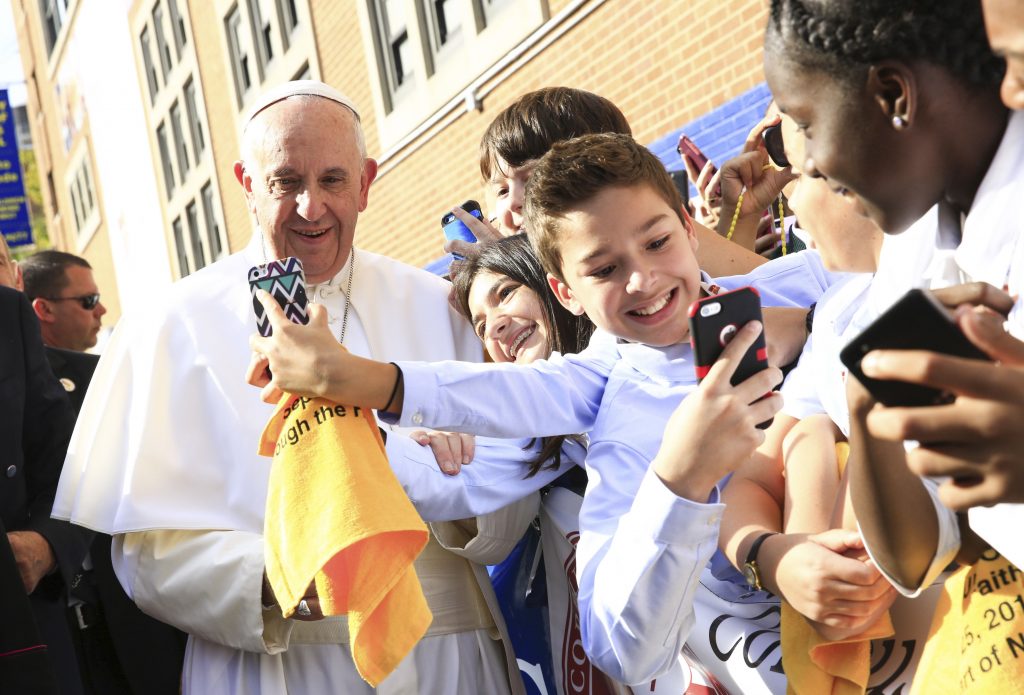The installation of Pope Francis five years ago coincided with the launching of my first two children into “adulthood” — if one can call the bacchanalia of university adulthood. As we sent off our goslings, suddenly grown great geese, my husband and I felt not only bereft but terrified.
We were sending them into a world with a very low opinion of human nature and its capacity for goodness and courage. For our children to succeed, to be happy, they would have to swim against the tide.
I could hear Pope Francis exhorting them to do just that in “The Courage to Be Happy: The Pope Speaks to the Youth of the World” (Orbis, $20), a fantastic collection of the pope’s words of encouragement and hope to young people set for release on April 24.
In many messages and speeches for World Youth Days, he has spoken about our relativist and ephemeral culture, and the way it promotes pleasure and self-realization as the highest goods.
He has asked young people to be “revolutionaries.” “I ask you,” he said, “to swim against the tide. Yes, I’m asking you to rebel against this culture that sees everything as temporary and that ultimately believes you are incapable of responsibility, that believes you are incapable of true love. … Have the courage to ‘swim against the tide.’ Have the courage to be happy!”
Ah, there it is — happiness. What every parent wants for their sons and daughters, what we toil and scrape to give them. The Holy Father has warned us so affectionately against misunderstanding the nature of true happiness, and the way to achieve it.
We cooperate with the broken wider culture when we mistake economic success, professional prestige and popularity with happiness, and encourage our children to strive for these.
Soon we find out that our children can be pleased and exhilarated with their achievements and possessions, but it’s awful when they turn them into idols and become enslaved to them! They simply end up unsatisfied, always wanting more — unhappy.
Even worse than making idols of material possessions and professional success, the culture of the ephemeral encourages young people to avoid unhappiness by running away from responsibility and the self-giving of true love.
For the well-trained youth, there is no mistaking the nature of the hookup culture — the epitome of irresponsibility and mutual usage. Its clarity makes it easy to resist. But other traps are more subtle.
When a young man and young woman fall in love, sex is proposed as natural and loving, while the possibility of marriage is so far in the future, and its success so doubtful, that it does not even come under consideration. But sex outside the dignified margins of marriage is never the expression of love.
Pope Francis beautifully explains that true love is chaste. In a hedonistic world, it is “the way of genuine love, of a love that is able to give life, that does not seek to use the other for one’s own pleasure. It is a love that considers the life of the other person sacred … love makes sacrifices for others. … Love is service.”
How wonderful to hear Pope Francis’ take on the world and its emphasis on pleasure, doing battle with materialism and superficiality on our behalf, helping us to teach our children that love, when it is true, gives everything to the beloved, including the whole future with all its possibilities and eventualities.
It is not satisfied with half measures and temporary arrangements, with hole-in-the-corner affairs. It welcomes responsibility: emotional, financial, spiritual, and finds the burden light.
The last five years have given us a Holy Father who can paint a picture of true happiness for our children, one that attracts and compels. It is a picture that connects the dots for them — between courage and responsibility and love that gives life and lasting joy.
It is beautiful to hear the clear and tender voice of the shepherd who knows where are the verdant pastures, and where the dangerous cliffs. Parents like my husband and me are so grateful for his help.
Dr. Grazie Pozo Christie grew up in Guadalajara, Mexico, coming to the U.S. at the age of 11. She has written for USA TODAY, National Review, The Washington Post and The New York Times, and has appeared on CNN, Telemundo, Fox News and EWTN. She practices radiology in the Miami area, where she lives with her husband and five children.

